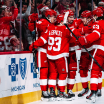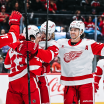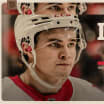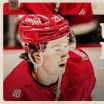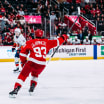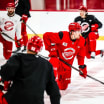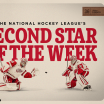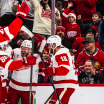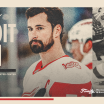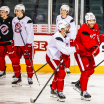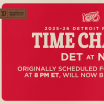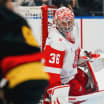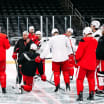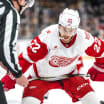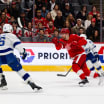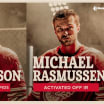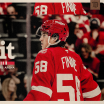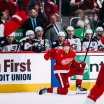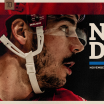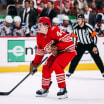COPENHAGEN, DENMARK -- In 26 years as an NHL player, including 10 with the Detroit Red Wings, Chris Chelios won three Stanley Cups, earned three Norris Trophies as the league's best defenseman as well as the Mark Messier Leadership Award.
He also represented Team USA at the World Junior Championship, three Canada Cups, four Olympics - earning a silver medal in 1998 - as well as the World Cup of Hockey in 1996, where the United States defeated Canada in Canada to win the championship, and the 2004 World Cup of Hockey.
Wings' Chelios adds another honor to long list of accomplishments
Team USA stalwart inducted into IIHF Hall of Fame
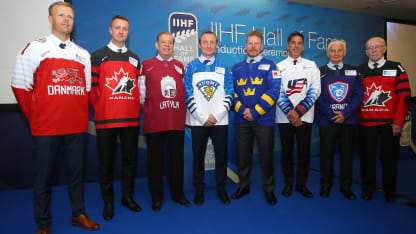
© Andre Ringuette/HHOF-IIHF Images
By
Julie Robenhymer @JulieRobenhymer / Special to DetroitRedWings.com
Upon retirement, Chelios was immediately inducted into the U.S. Hockey Hall of Fame in 2011, was a first-ballot selection for the Hockey Hall of Fame in 2013 and completed the trifecta last month as he was inducted into the IIHF Hall of Fame during the 2018 IIHF World Championship held in Denmark.
"I never envisioned myself making it to the NHL," Chelios said during his acceptance speech. "My goal was going to college and making the Olympic team. I thought, what a great honor that would be to represent your country and what a dream to be able to be one of those 22 or 24 players and I'm very fortunate to say that my dream came true."
After the ceremony, he recalled his first experience wearing the red, white and blue. It was an exhibition game against Russia before the 1982 World Junior Championship in Minnesota -- an 8-0 loss.
"They scored all eight goals in the first period and, fortunately, Russia just stopped shooting in the second and third because it could have been 20-0," Chelios explained. "It was bad and I was determined to not only be a better player, but to help get USA Hockey to a better level. That loss motivated me for the rest of my career."
Like most professional athletes, Chelios hated to lose almost as much as he loved to win. "Winning is contagious and once you get a taste of it, you just want more and more," he explained. "The first time I won something big was in high school and it doesn't matter what level it's at, to share a championship with your teammates, there's just nothing like it. You just want to keep doing it and that's what drove me.
"I just wanted to win."
Watching Team USA defy the odds to win the gold medal at the 1980 Olympics, Chelios, who was 18 at the time, had a clear vision for his future.
"Once I saw that game in '80 -- I was in Moose Jaw when they won -- and I told myself I wanted to be on that team and it instantly became a dream of mine and my goal to be an Olympian," he said. "I was the only American playing in Canada at the time in the junior leagues and I really thought I had a chance of making the team in '84. I just needed to get into college. That's all I knew. The Olympic players were coming from colleges, so I needed to be good enough to play in college. Then, to get a scholarship to Wisconsin and win a national championship in '83, it was unbelievable. Then, that summer, my dream came true."
Chelios made the 1984 US Men's Olympic team and left Wisconsin after his sophomore season to train with the national team prior to the Olympics in Sarajevo.
"We played 60 games against really tough opponents that year and it prepared me not only for the Olympics, but for a career in the NHL," he said. "At that time, guys didn't train like they do now. Having the opportunity to play internationally against older, bigger, faster, stronger, more talented players just took me to a different level. That six months, traveling around with that '84 team and playing NHL teams, American League teams, European league teams, it made me such a more well-rounded player and raised the bar of my expectations for myself and what I could accomplish."
While marching in the opening ceremonies of the 1984 opening ceremonies in Sarajevo is high on his list of favorite international experiences, the World Cup of Hockey in 1996 and beating Canada in Canada to win the gold medal reigns supreme.
"It's the only time we've been on the right side against Canada," he said, still smiling at the memory. "I will never forget being a part of that team. It was just so special and it shifted the dynamic for American hockey players and was the start of real growth in developing American players that we're continuing to see more and more of in the NHL 20 years later. Being on the team, winning that game, that tournament was the highlight of my international career."
USA Hockey executive director Pat Kelleher has been with the organization since 2000 and said Chelios is certainly deserving of receiving the highest international honor.
"A lot of people use the term warrior to describe Chris Chelios and the way he played and that's true, but we also like to use the word ambassador," he said. "That's not something you always think of, but what he's done for us as a player and being part of the evolution of USA Hockey from hoping to win medals to expecting to win medals and winning championships -- his brashness and his attitude are a big part of USA Hockey and our team and our players now having these high expectations that we have today."
Since his retirement, Chelios has stayed involved with USA Hockey as a coach. First, he assisted with the national junior team at the 2016 World Junior Championship and most recently at the 2018 Winter Olympics in PyeongChang.
"What he's done as a coach has been huge," Kelleher continued. "I know at the Olympics, the admiration and respect that the current players have for him is impressive. He's just special in so many ways and an incredible representative of USA Hockey. We are so proud of him to receive this honor. It is very well deserved."
Nick Lidstrom was also at the ceremony to support Chelios and fellow Swede and inductee Daniel Alfredsson.
Having both the experience of playing against him both in the NHL when Chelios was with the Chicago Blackhawks and in international play when Lidstrom played for Team Sweden as well as with him when they played for the Red Wings together for 10 seasons, he has a unique perspective on what Chelios brought to any team he played for.
"You hated playing against him," Lidstrom said matter-of-factly. "There's no question about that. Hated it. But, having him on your team was great because he was a warrior out there and always in someone's face, always battling, hated to lose and that's the kind of guy you want to have as a teammate. He was always a team-first guy. He was a great leader and a great warrior and he set the tone for the teams he was on and when you thought about Team USA, you thought about Chris Chelios."
Upon his retirement in 2010, Chelios stayed involved with the game as a member of Red Wings management and now serves as an assistant coach, but only when the team is at home.
"People ask me every day if I miss it and I don't miss the grind of playing, but I'm definitely fortunate to still be involved with the game," he explained. "I tried assistant GM my first year after retirement and then I tried player development, but there's nothing like coaching and being in the room. It's almost as good as being on the ice. The only problem is when things don't go well, you can't get on the ice and help your players out."
He said the only thing holding him back from coaching full-time is the commitment of an 82-game schedule and the travel that comes with it.
"I missed so much time with my family and my kids while I was playing that I've just been trying to spend as much time with them as I can," he said. "I really enjoy coaching, but I also love spending time with my family and going to their hockey or lacrosse games and theater, whatever it is. I wasn't able to be there then, but I'm able to be there now. When they're all grown up -- and we're almost there -- maybe that will change. Right now, I just want to be with them as much as I can."
As Chelios remembers the past and reflects on his impact on American hockey, he can't help but be excited about the future.
"It's been a long journey and I'm not the pioneer, but I had a front row seat to the evolution of USA Hockey from the late 80's to the creation of the development program to where we are now and the expectations we have to win medals and it is so exciting to think about what's next and what the future holds for American hockey players," he said.
"I can honestly say, in the beginning we didn't really feel like we were on that level of all the other countries, but we worked hard and we got there and we've stayed there and it's been great to be a part of that process."

